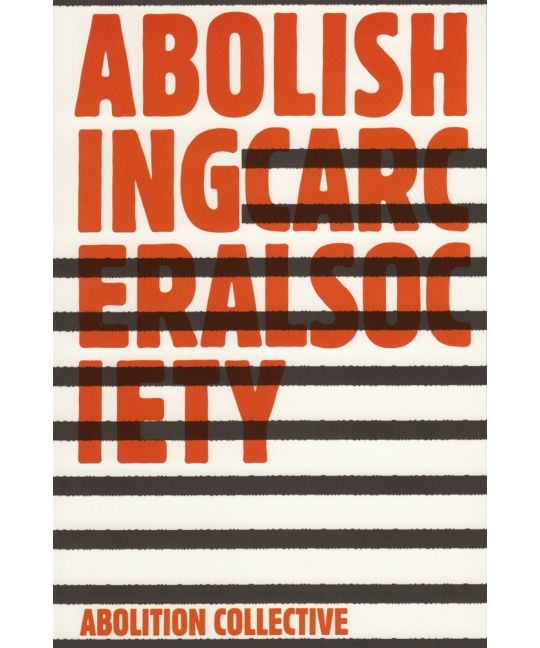AK Press
Abolishing Carceral Society
Abolishing Carceral Society
Couldn't load pickup availability
Beyond border walls and prison cells—carceral society is everywhere. In a time of mass incarceration, immigrant detention and deportation, rising forms of racialized, gendered, and sexualized violence, and deep ecological and economic crises, abolitionists everywhere seek to understand and radically dismantle the interlocking institutions of oppression and transform the world in which we find ourselves. These oppressions have many different names and histories and so, to make the impossible possible, abolition articulates a range of languages and experiences between (and within) different systems of oppression in society today.
Abolishing Carceral Society presents the bold voices and inspiring visions of today’s revolutionary abolitionist movements struggling against capitalism, patriarchy, colonialism, ecological crisis, prisons, and borders.
In the first of a series of publications, the Abolition Collective renews and boldly extends the tradition of “abolition-democracy” espoused by figures like W.E.B. Du Bois, Angela Davis, and Joel Olson. Through study and publishing, the Abolition Collective supports radical scholarly and activist research, recognizing that the most transformative scholarship is happening both in the movements themselves and in the communities with whom they organize.
Abolishing Carceral Society features a range of creative styles and approaches from activists, artists, and scholars to create spaces for collective experimentation with the urgent questions of our time.
Through essays, interviews, visual art, and poetry, each presented in an accessible manner, the work engages with the meaning, practices, and politics of abolitionism in a range of historical and geographical contexts, including: prison and police abolitionism, border abolition, decolonization, slavery abolitionism, antistatism, antiracism, labor organizing, anticapitalism, radical feminism, queer and trans politics, Indigenous people’s politics, sex worker organizing, migrant activism, social ecology, animal rights and liberation, and radical pedagogy.
“Abolishing Carceral Society is an immense contribution to contemporary struggles for freedom. The pieces in this collection provoke new questions that inform resistance strategies, and deepen our understandings of the systems we are seeking to abolish and the social relations we are working to transform. This collection will be a profoundly useful tool in classrooms and activist groups. The conversation happening in Abolition is essential reading for those participating in the thorny, complex debates about how we dismantle structures of state violence and domination. The writers and artists whose work makes up the inaugural issue of Abolition, rigorously explore the most pressing questions emerging in liberation struggles.”—Dean Spade, author of Normal Life: Administrative Violence, Critical Trans Politics and the Limits of Law
“Abolishing Carceral Society is a wonderful mix of provocative ideas married with art, to help us consider a world without prisons, policing, and surveillance. Many of the submissions, however, are less concerned with dismantling what exists than they are with taking seriously that abolition is a project interested in building and in practical organizing. This comes through particularly in David Turner's essay, among others. Abolishing Carceral Society asks us some questions that we sometimes prefer to ignore, like ‘What does it mean to transform human relations?’ This inaugural issue from Abolition pushes us to ask a number of questions that are important to moving us toward an abolitionist horizon.”—Mariame Kaba, founder of Project NIA, and cofounder of Chicago Freedom School, Chicago Taskforce on Violence Against Girls & Young Women, and Love & Protect
“Abolition is a crucial contribution to radical social movements. While fighting against prisons and the death penalty as instruments of class rule, the journal amplifies the voices of the incarcerated, actively engages with organizers on the ground, and builds bridges across multiple movements. The first issue, Abolishing Carceral Society, presents incisive interventions in the current debates about prison abolition and abolitionism as a political principle. It is a bold beginning for what will become an essential forum for all insurgent thinkers.”—Silvia Federici, author of Revolution at Point Zero: Housework, Reproduction, and the Feminist Struggle and Caliban and the Witch: Women, the Body, and Primitive Accumulation
“From slavery to prisons, abolition has always been a project of courage and breadth. Abolishing Carceral Society brings to bear the reflective, transformative urgency needed to confront today's violent world order. Of the struggle, by the struggle, and for the struggle: this auspicious collection offers not answers but pathways down which contemporary abolitionists travel en route to a future freedom. Check out their words, scope their visions—heed their calls.”—Dan Berger, author of Captive Nation: Black Prison Organizing in the Civil Rights Era


